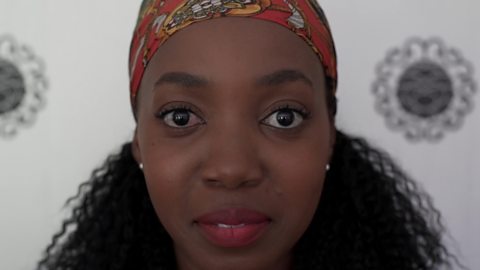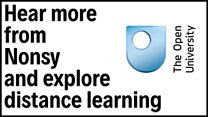Unit 4: Go The Distance: Academic writing
Select a unit
- 1 Go The Distance: Choosing distance learning
- 2 Go The Distance: Academic reading
- 3 Go The Distance: Academic talk
- 4 Go The Distance: Academic writing
- 5 Go The Distance: Finding and using source material
- 6 Go The Distance: Going the distance
- 7 Go The Distance: Critical thinking
- 8 Go The Distance: Social learning
- 9 Go The Distance: Projects
- 10 Go The Distance: Succeeding in exams
Session 1
Student Life 4 – Academic writing
Welcome back to our Student Life series. We're following genuine distance learners at work, rest and play. In each episode we hear how they face up to the challenges of academic study while dealing with day-to-day life. Let's meet our next student! This time Nonsy tells us about how she develops her academic writing skills!
Activity 1
Getting it right with academic writing
Nonsy lives in Southport in the UK. She's doing a degree in Childhood and Youth Studies as a distance learner – and she's got a lot of written assignments to complete! She also has a serious health condition as well as family responsibilities. She told us how she manages to juggle all her commitments and stay on course for academic success.
Scroll down to watch the video and hear Nonsy's tips for getting on with academic writing.
Nonsy - staying active for study success

We asked Nonsy about her experience with distance learning. Watch the video to find out what she says about studying with a serious health condition and succeeding at academic writing.
To do
While you watch the video, note down what Nonsy says about dealing with her assignments – she has THREE useful tips relating to structure, word count and vocabulary. See if you can spot them all and check your answers – with our quiz question – later on this page.
User tips
- Turn on subtitles by clicking on the 'S' button in the video player.
- Click on the 'expand' icon to view the video in full screen.
Watch the video

Nonsy
I live with my boyfriend and his family in Southport and I'm studying Childhood and Youth Studies via distance learning. Living with the boys, I get to spend quite a lot of time with them. I try and do a bit of reading with them as well, where they don't feel that pressure to like, I have to do well or do this, but just try and enjoy things. My sister, she's 16 years younger than me, and seeing her develop right before my eyes, I became so fascinated, and so I thought, "Do you know what, I want to know more," and then I embarked is a module with my university, from there it developed into what is now my Childhood degree.
My boyfriend's kidneys failed when he was about 22 and he's been on dialysis since, so he goes Monday, Wednesdays and Friday evenings after work, so he comes home from work, quickly gets changed and I take him to dialysis.
I've also been suffering with fibromyalgia for the last five or six years now. When your nervous system doesn't respond as it should: it's sending pain signals to your brain. So it affects my whole body, as it were, but mainly my back, and my fingers, they start to hurt. I get like fibro-fog, so I can't concentrate.
Tried all the medication that I could, I got a bit of side effects with quite a few of them: anxiety, depression, so I don't take any medication now, and I started running as well, and when I was more active, it seemed to keep the pain at bay for a bit longer, so now I'm more focussed on doing things that are natural and that won't be as harmful to my body.
I think distance learning with my fibromyalgia has been good for me: it's more flexible, and also I'm not as anxious because I know that what I miss, I can always make up. On the bad days I sort of have to email my tutor and say, "Can I just have an extension?" and they've always known, because every time I register for a new module, they're told that I've got this condition so just be a bit more supportive, I suppose.
So in my modules my assignments were mainly just, your normal 3000-word assignments. I used to use the P-E-E format to do my assignments and it's point, example and explanation. So any time you make a point, you have to have an example, and you have to explain how it relates to the question. So I used that literally religiously with all my assignments, and it helped me just stay on track.
I always had a plan. So I'd split up the word count so if it's four paragraphs then I'm going to do 400 words here 400 there, 200 for the intro, 200 for the conclusion. I had a little list of like words I could use, just to jog my memory 'cos when you're writing an assignment, you can't think of all those things, and if I wanted to add another point, there would be 'additionally', 'furthermore' or if I was contrasting that point, 'however' or…
Each time I did an assignment I'd pin up my list of words, my plan and everything else, and little key words or like bubble points of what I needed to put in so any time I got stuck, I'd just think, "Right, look at your plan." I used to write trigger words as well, so for each paragraph, there were trigger words – things I'd have to include which I got from the assignment sheet.
Whenever I needed help, whenever I was stuck with my assignment, I'd email my tutor and then I'd say 'Can we arrange a call?' and within less than a day, literally, she'd come back to me.
I did enjoy academic writing, I think more so in the end because I was starting to get grasp of it. My top tips to anyone who was starting to do academic writing, I would say: be patient; don't be so hard on yourself. You can't possibly get it from the beginning, but be open to feedback, and also, just give it a go.
Go the distance.
Three keys to successful writing
Check you've understood the three things Nonsy mentions that help her with her academic writing. Click on 'choose' to see the answers.
Three keys to successful writing
3 Questions
Match the beginnings and endings of these phrases to form three tips about academic writing from Nonsy's video
Help
Activity
Match the beginnings and endings of these phrases to form three tips about academic writing from Nonsy's video
Hint
Nonsy mentioned a technique called P-E-EQuestion 1 of 3
Help
Activity
Match the beginnings and endings of these phrases to form three tips about academic writing from Nonsy's video
Hint
Nonsy said she would "split up the word count so if it's four paragraphs then I'm going to do 400 words here 400 there"Question 2 of 3
Help
Activity
Match the beginnings and endings of these phrases to form three tips about academic writing from Nonsy's video
Hint
Nonsy said she " had a little list of words" she could use when working on her assignmentsQuestion 3 of 3
Excellent! Great job! Bad luck! You scored:
What we've learned
You've nearly reached the end of this unit. At the bottom of this page you can find links to more useful materials for distance learners – and would-be distance learners!
But before we finish, let's recap what we've learned about dealing with academic writing so far.
- Try to structure your writing – Nonsy uses the P-E-E format. Make a Point, give an Example and Explain how it relates to your assignment question.
- Remember: your tutors are there to help! Get in touch with them if you need guidance.
- Split up the word count – for example, 1000 words could mean 100 words for the introduction, 100 for the conclusion and 800 for the body.
- Keep a list of key words to refer to and use in your writing, such as 'furthermore' to add information; 'however' to introduce a contrast.
- It's a good idea to talk to your tutors as soon as possible if you're struggling – if you can't make an assignment deadline, let them know!
Find out more
There's lots more about Nonsy and her academic writing experience to see by visiting our partner The Open University. Click on The OU 'Where next?' link to find out more.
Where next?
Session Vocabulary
Find out more about distance learning – visit our partner,The OU


